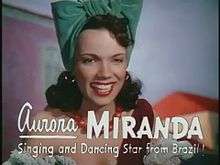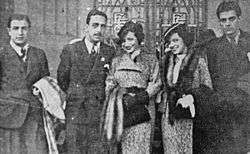Aurora Miranda
| Aurora Miranda | |
|---|---|
 Aurora Miranda in The Three Caballeros | |
| Born |
Aurora Miranda da Cunha 20 April 1915 Rio de Janeiro, Brazil |
| Died |
22 December 2005 (aged 90) Rio de Janeiro, Brazil |
| Resting place | São João Batista Cemetery, Rio de Janeiro, Brazil |
| Occupation | Singer, dancer, actress |
| Years active | 1933–1990 |
| Spouse(s) |
Gabriel Richaid (m. 1940–1990) |
| Relatives |
|
Aurora Miranda da Cunha Richaid (20 April 1915 – 22 December 2005) was a Brazilian singer and actress. She began her career at the age of 18 in 1933. Miranda appeared in several films, including The Three Caballeros, where she danced with Donald Duck and José Carioca, singing the song, "Os Quindins de Yayá". Her sister was Carmen Miranda.[1]
Career


Aurora Miranda had a successful career in Brazil and the US, perhaps overshadowed by that of her sister, Carmen Miranda. Aurora was six years younger than her sister, not as brilliant but equally talented and vivacious.
In 1932, aged 18, she was asked to perform on the Mayrink Veiga radio station by Josué de Barros, the same composer who had launched her sister's career 10 years earlier. Soon she was snapped up by a rival station and within 12 months she had released her first record, Cai, Cai, Balão ("Drop, Drop Balloon") alongside the crooner then considered Brazil's rei da voz or "king of the voice", Francisco Alves. Alves was known for supporting up-and-coming artists and there was none more promising than Aurora, who many still believe had a more beautiful voice than Carmen.
She made her recording debut on 25 May 1933, at the age of 18. On that day, Aurora sang Assis Valente's marcha Cai, Cai, Balão! and Floriano Ribeiro de Pinho's samba Toque de Amor in duo with Francisco Alves, Brazil's greatest male singing star. Three weeks later, she was in the studio again, recording a macumba by Pixinguinha and João da Bahiana. Another duo with Chico Alves came in July: Noel and Helio Rosa's foxtrot Você só... Mente. Aurora was launched.
Her record company was Odeon. Aurora's principal competitor - Carmen - was at Victor. During the rest of the decade, Aurora recorded 162 more sides, many of them enormous hits, such as Cidade Maravilhosa written by André Filho and Se a Lua Contasse by Custódio Mesquita,whose composers were her constant songwriters, along with Walfrido Silva and Assis Valente.[2]
In 1936, Aurora appeared in the film Hello, Hello, Carnival!, where she was seen with Carmen, dressed in gold-lamé top hat and tails, singing Cantores do Rádio composed by João de Barro and Alberto Ribeiro with Lamartine Babo. This film is apparently lost except for some short sequences.
In 1940, Aurora married Gabriel Richaid. Carmen gave the couple a trip to the USA as a honeymoon present, and before long, Aurora was appearing in American nightclubs and revues. During the war, when Disney was producing his Good Neighbor south-of-the-border films, he wanted to cast Carmen with Ethel Smith in Blame It on the Samba. Carmen was unavailable, and the technology wasn't yet advanced enough for making that film, which would eventually appear in 1948 with Ethel as the only live character. But Carmen recommended her sister, and Aurora was cast in The Three Caballeros, where she shone in the Bahia sequence, dancing with Donald Duck and Zé Carioca to the tune of Ary Barroso's Os Quindins de Iaiá. She also appears in the film noir classic Phantom Lady (1944) where she can be seen as a night club performer.[3]
Years later, she appeared in the documentaries Once Upon a Mouse and Carmen Miranda: Bananas is My Business.
Personal life
In 1940 she married Gabriel Richaid clad in a gold-embroidered wedding dress shipped from the US by Carmen.
Unlike her sister, Aurora preferred married life to her career. In 1951 she returned to Rio and settled down as wife and mother. She often spoke of her sister Carmen and appeared in many documentaries.
Legacy
Aurora Miranda carved out her own niche, first as a pioneering singer and later as the first human being to interact with cartoons in a Walt Disney production. She appeared in the film The Three Caballeros, a mix of cinema and animation in which Aurora starred alongside Donald Duck.
But perhaps her greatest legacy was the first recording of Rio de Janeiro's unofficial anthem, Cidade Maravilhosa (Marvellous City), in 1934.
Tom Philips wrote in The Guardian that Aurora Miranda "personified the spirit of Rio."
Filmography
.jpg)
| Year | Title | Role | Notes |
|---|---|---|---|
| 1935 | Alô, Alô, Brasil! | Performer: "Cidade Maravilhosa" and "Ladrãozinho" | |
| Estudantes | Herself | Performer: "Onde Está o Seu Carneirinho?" and "Linda Ninon" | |
| 1936 | Hello, Hello, Carnival! | Performer: "Cantores do Rádio" and "Molha o Pano" | |
| 1939 | Banana da Terra | Herself | Performer: "Menina do Regimento" |
| 1944 | Phantom Lady | Estela Monteiro | |
| The Conspirators | Fado Singer | Uncredited | |
| Brazil | Bailarina, Specialty Dancer | ||
| The Three Caballeros | The Brazilian Girl | (as Aurora Miranda of Brazil) | |
| 1945 | Tell It to a Star | Specialty Act | |
| 1954 | Disneyland | Brazilian Girl | Voice, A Present for Donald (archive footage) |
| 1978 | Mulheres de Cinema | Herself | (archive footage) (Documentary short) |
| 1981 | Once Upon a Mouse | Herself | |
| 1990 | Dias Melhores Virão | Aurora | |
| 1995 | Carmen Miranda: Bananas is my Business | Herself | Documentary |
| 2009 | Cantoras do Rádio - O Filme | Herself | (archive footage) |
See also
References
- ↑ "Overview for Aurora Miranda". Turner Classic Movies. Retrieved March 20, 2014.
- ↑ Tom Philips (6 March 2006). "Obituary: Aurora Miranda". The Guardian. Retrieved March 20, 2014.
- ↑ "Irmã de Carmem Miranda morre aos 90 anos". Folha de S.Paulo. December 23, 2005. Retrieved March 20, 2014.
- ↑ "Morreu a irmã de Carmen Miranda". Diário de Notícias. December 25, 2005. Archived from the original on December 17, 2013. Retrieved March 20, 2014.
- ↑ Daniele Barreira (December 24, 2005). "Morre, aos 90 anos, irmã de Carmem Miranda". Ofuxico. Retrieved March 20, 2014.